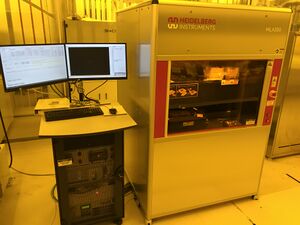Maskless Aligner (Heidelberg MLA150): Difference between revisions
→Documentation: pic of spatial light modulator |
|||
| Line 47: | Line 47: | ||
'''Important:''' You must be <u>authorized by a supervisor</u> to use the tool! The video below is provided for reference only, and does not substitute training by NanoFab staff. |
'''Important:''' You must be <u>authorized by a supervisor</u> to use the tool! The video below is provided for reference only, and does not substitute training by NanoFab staff. |
||
* [https://gauchocast.hosted.panopto.com/Panopto/Pages/Viewer.aspx?id=7f1b329d-e5c6-47c7-8443-ac6701348af5 Heidelberg MLA150 Training Video (on GauchoSpace/Panopto)] |
* [https://gauchocast.hosted.panopto.com/Panopto/Pages/Viewer.aspx?id=7f1b329d-e5c6-47c7-8443-ac6701348af5 Heidelberg MLA150 Training Video (on GauchoSpace/Panopto)] |
||
=== Documentation from HIMT === |
|||
[[File:MLA150 Spatial Light Modulator Description.png|alt=Schematic of spatial light modulator exposure technique.|none|thumb|682.9891357421875x682.9891357421875px|Exposure method using a spatial light modulator and continuously moving stage. See [https://heidelberg-instruments.com/en/features-technologies/key-features/maskless-lithography.html HIMT] for more info.]] |
|||
== Design Tools/Info == |
== Design Tools/Info == |
||
Revision as of 01:09, 5 November 2020
|
About
The MLA150 allows for arbitrary direct-write patterning of I-Line photoresists from an uploaded CAD drawing/file (GDS, DXF, CIF etc.). The system uses a digital micromirror device ("DMD", an array of MEMS mirrors) for patterning the exposure light-field, to programmatically expose digitized patterns directly onto the sample - no glass photomasks/reticles are required.
Depending on the exposure options and write area, the MLA is able to expose a 100mm wafer in about 30min, and achieves minimum features sizes around 0.5µm, with overlay/alignment accuracy better than 200nm.
The system has a continuous, automatic autofocus, using pneumatic and optical detection. This potentially enables lithography on non-planar or curved substrates.
The software allows for custom drawings and aligment marks to be exposed onto any feature located on the microscope.
Greyscale lithography allows for photoresist profiles with repeatable slanted or tapered structures.
The high-aspect ratio (variable/long focal length) option enables vertical sidewalls on very thick (~100µm) photoresists.
Detailed Specifications
- Substrate size: 9-inch square or 200mm round down to 5-mm pieces
- Wafer / substrate thickness: Max. 9mm / Min. 0.1mm
- Exposure optics:
- Digital micromirror device (DMD)
- Laser #1: 375nm
- Laser #2: 405nm
- Alignment Accuracy: ≤ 200nm
- Linewidth variation: ≤100nm
- Additional manufacturer options:
- High-resolution option (Write Mode 1)
- Extended Focus Range
- Variable Focal Depth
- Optical (laser) Autofocus in addition to Pneumatic Autofocus
Documentation
Operating Procedures
Video Trainings
Important: You must be authorized by a supervisor to use the tool! The video below is provided for reference only, and does not substitute training by NanoFab staff.
Documentation from HIMT

Design Tools/Info
Recipes
- Recipes > Lithography > Maskless Aligner MLA150
- Starting recipes for various I-Line photoresists
